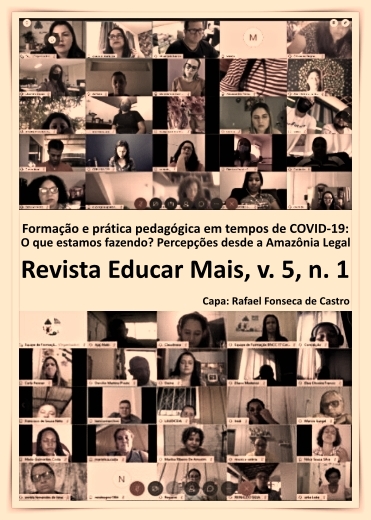Continuous virtual training in Physical Education in the municipalities of Porto Velho and Candeias do Jamari/ro: challenges in COVID-19 times
DOI:
https://doi.org/10.15536/reducarmais.5.2021.2116Keywords:
Formação continuada; Professores; Educação Física; Educação Remota; Covid-19.Abstract
This research has as object at the virtual continuing education of multipliers and teachers, from the adequacy of the Curricular Reference of Physical Education of the State of Rondônia and as objectives to analyze the virtual continuing formations of multipliers and teachers from the initial years of the municipalities of Porto Velho and Candeias do Jamari and their challenges in times of Covid-19. The training was planned for the beginning of 2020, in the face-to-face mode, however, with the advent of the pandemic and the stoppage of face-to-face activities, it was necessary to reformulate the strategies of the actions with the support of remote technology, using platforms and virtual tools for the formation of 42 multipliers of the municipalities of Rondônia and 230 teachers of Porto Velho and Candeias do Jamari. This is a quantitative-qualitative and descriptive research. For data collection, two questionnaires were applied to identify the most appropriate tools for training, as well as their advantages, limits and difficulties. It is expected that it will be possible to generate contributions to public policies for teacher training.
Downloads
References
ASSIS, Maria Cristina de. Metodologia do trabalho científico. In: FARIA Evangelina Maria B. de; ALDRIGUE, Ana Cristina S. (Orgs.). Linguagens: usos e reflexões. João Pessoa: Universitária/UFPB, 2008, v. II.
BERGMANN, B. Sala de aula invertida: uma metodologia ativa de aprendizagem / Jonathan Bergmann; Aaron Sams; tradução Afonso Celso da Cunha Serra. 1. ed. Rio de Janeiro: LTC, 2018.
BRASIL. Ministério da Educação. Secretaria de Ensino Fundamental. Programa de Formação de Professores Alfabetizadores – Guia de Orientações Metodológicas.
BOND, Aron. Diferença entre o aprendizado online e o ensino remoto de emergência. Revista da Escola, Professor, Educação e Tecnologia. Este artigo foi publicado originalmente no EDUCAUSE Review em 27 de Março de 2020. Traduzido por Danilo Aguiar, Dr. Américo N. Amorim e Dra. Lídia Cerqueira, com a permissão dos autores. Revista da Escola, Professor, Educação e Tecnologia v. 2 2020 escribo.com/revista.
BORGES, Célio José. Formação e profissionalização de professores leigos em Rondônia: um estudo de caso – O PROHACAP (Programa de Habilitação e Capacitação de Professores) – Araraquara (SP): FCL., 2011. Tese (Doutorado).
CHANTRAINE-DEMAILLY, Lise. Modelos de formação continua e estratégias de mudança. In Novoa, Antônio (org). Os professores e a sua formação. Lisboa: Dom Quixote, 1997.
CRESPO, N. D. O. et al. Ferramentas Digitais para o Ensino - O ensino remoto em evidência. Recife: Even3 Publicações, 20201. Livro digital; 85 p. il.ISBN: 978-65-88243-44-2
FADEL, L.M. et al. Gamificação na educação. São Paulo: Pimenta Cultural,
300p ISBN: 978-85-66832-13-6.
FILATRO, Andrea. Como preparar conteúdos para EAD. 1. ed.- São Paulo: Saraiva, 2018.
FREITAS, M. I. C. de; CABRAL, M. P. The mapping in the continuing education of teachers: an experience through distance learning. In: International Technology, Education and Development Conference. Valencia, Espanha, 2011, v. 1. p. 1263-1268. Gerais. Brasília: MEC/SEF, 2001
GARCIA, Carlos Marcelo. A formação de professores: novas perspectivas baseadas na investigação sobre o pensamento do professor. In: NÓVOA, Antonio (org.). Os professores e a sua formação. Lisboa, Portugal: Dom Quixote, 1997.
GOOGLE. In: WIKIPÉDIA, a enciclopédia livre. Flórida: Wikimedia Foundation, 2020.Disponível em:<https://pt.wikipedia.org/w/index.php?title=Google&oldid=59409662>. Acesso: 21 set. 2020.
HODGES, Charles, MOORE, Stephanie, LOCKEE, Barb, TRUST, Torrey e HODGES, Charles, MOORE, Stephanie, LOCKEE, Barb, TRUST, Torrey e LIBÂNEO, J. C. Didática. 22a. ed. São Paulo: Cortez, 2004.
JORNAL BRASIL SEIKYO. Edição 1843 - 13/05/2006 – p. A2 – Editorial.
LEVY, Steven. Google a biografia. São Paulo: Universo dos Livros, 2012.
MORAN, José M.; MASETTO, Marcos T.; BEHRENS, Marilda A. Novas tecnologias e mediação pedagógica. 3. ed. Campinas (SP): Papirus, 2000.
PACHECO, José Augusto Brito. O Pensamento e a Acção do Professor. Porto, Portugal: Porto, 1995.
PLACCO, Vera Maria. Nigro. Souza; SOUZA, Vera Lucia Trevisa (Orgs.). Aprendizagem do adulto professor. São Paulo: Loyola, 2006.
REVISTA SGI Quarterly. O mundo em 2030. Número 82. São Paulo, BSGI, 2015.
SANTANA, Lucas - Ensino remoto: Como aproveitar as ferramentas google e outros recursos digitais. Disponível em: https://novaescola.org.br/conteudo/19799/ensino-remoto-como-aproveitar-as-ferramentas-google-e-outros-recursos-digitais, Acesso:15/10/2020.
SILVA, Marijâne Silveira et al. Múltiplos olhares sobre a formação de professores no Brasil. Rondônia. Edufro. 2020).
Downloads
Published
How to Cite
Issue
Section
License
Copyright (c) 2021 Clarice Lemos Ferreira, Márcia Gonçalves Vieira, Cleidimara Alves, Alan Raniere Silva Xavier, Célio José Borges

This work is licensed under a Creative Commons Attribution-NonCommercial 4.0 International License.
DECLARATION OF RESPONSIBILITY: I hereby certify that I partially or fully participated in the conception of the work, that I did not hide any links or financial agreements between the authors and companies that may be interested in this article publication. I certify that the text is original and that the work, partially or fully, or any other work with a substantially similar content written by me, was not sent to any other journal and it will not be send while my submission is being considered by Revista Educar Mais, whether in printed or electronic format.
The author responsible for the submission represents all the authors of the manuscript and, when sending the article to the journal, guarantees s/he has obtained the permission to do so, as well as s/he guarantees the article does not infringe upon anyone’s copyright nor violate any proprietary rights. The journal is not responsible for the opinions expressed.
Revista Educar Mais is Open Access, does not charge any fees, whether for submission or article processing. The journal adopts Budapest Open Access Initiative (BOAI)’s definition, i.e., any users are permitted to read, download, copy, distribute, print, search and link to the full texts of these articles.
All the articles are published under the Creative Commons Atribuição-NãoComercial 4.0 Internacional license. The authors keep the copyright of their production. That way, they must be contacted directly if there is any interest in commercial use of their work.
















